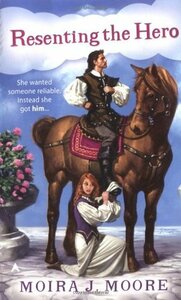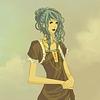Take a photo of a barcode or cover
The worldbuilding screams ‘oppressive BS’. Slave-class via genetics. Not nuanced at all.
She’s prejudiced, judgemental, arrogant and impulsive and he’s a tortured hero. No new ground
She’s prejudiced, judgemental, arrogant and impulsive and he’s a tortured hero. No new ground
This was a lot different than I was expecting. Based on the cover, I was expecting a silly fantasy romcom, but instead it was more scifi intrigue. Which isn't a bad thing. I really enjoyed the world that was built. I was also scared when I started reading it was going to be smut-also proved not to be the case!
It takes place in the distant future on a different planet, where technology doesn't work. I was thrown off a little at first with everyone being pansexual and that being the norm, but once I realized I was able to keep up. It wasn't a major point. Also, some of the themes were really well done. One major thing was the whole pointing out the problems with the system of bonding and magic. Our main character was in an ok situation, her Source was annoying, but not evil. However, regular people kept telling her that she was abused, that he didn't care about her and took advantage, when that wasn't true. That she was brainwashed by the system. I got really offended on her behalf, and it was really well done. And then later, when we're introduced to people wanting to shake the system, and I found myself uncomfortable with their radicalism-I had to stop and be like, why is this bothering me? "Because the system isn't perfect, but it's not toxic." But wait-it isn't toxic to Lee, but it is very toxic to some other shield's she's met. I didn't expect to see such a subtle example of privilege in this book-especially one where it's me checking my privilege, as opposed to the character checking hers. (Does that make sense?) That being said, realizing that didn't make me all of a sudden on the radical shield bandwagon for the world. It was a system that definitely needed to change, but change in more practical ways-rather than going from one extreme to the other.
All in all it was a really good book. It wasn't a romance, like I thought originally, and I loved all the twists. I'm excited to read the next books!
It takes place in the distant future on a different planet, where technology doesn't work. I was thrown off a little at first with everyone being pansexual and that being the norm, but once I realized I was able to keep up. It wasn't a major point. Also, some of the themes were really well done. One major thing was the whole pointing out the problems with the system of bonding and magic. Our main character was in an ok situation, her Source was annoying, but not evil. However, regular people kept telling her that she was abused, that he didn't care about her and took advantage, when that wasn't true. That she was brainwashed by the system. I got really offended on her behalf, and it was really well done. And then later, when we're introduced to people wanting to shake the system, and I found myself uncomfortable with their radicalism-I had to stop and be like, why is this bothering me? "Because the system isn't perfect, but it's not toxic." But wait-it isn't toxic to Lee, but it is very toxic to some other shield's she's met. I didn't expect to see such a subtle example of privilege in this book-especially one where it's me checking my privilege, as opposed to the character checking hers. (Does that make sense?) That being said, realizing that didn't make me all of a sudden on the radical shield bandwagon for the world. It was a system that definitely needed to change, but change in more practical ways-rather than going from one extreme to the other.
All in all it was a really good book. It wasn't a romance, like I thought originally, and I loved all the twists. I'm excited to read the next books!
I am so glad I read a review that told me not to judge this book by its cover. The story is great, and the characters are amazing. I love the attitude, confidence and dry tone of the heroine, and the charming yet frustrated male counterpart isn't bad either... Watching the friendship slowly grow between this unwilling pairing was a lot of fun, and the different tendencies of shields versus sources was quite original.
I'm thinking how to convey my feelings for this book, and bittersweet is the only adjective I come up with.
* Good story? Check.
* Interesting and original world and magic system? Check.
* Better than expected from the cover? Check.
* Main characters with potential? Check.
* Will I read the next installment? Nope.
Why?
Bittersweet.
I think my main peeve is the self-centered heroine and some incomprenhensible reactions not just from her, but from people surrounding her. I may understand a character who starts being annoying and changes along the way. It's called character growth, and it's expected. But this woman manages to be equally annoying all throughout the story. Remarkable, in a sense.
Unfortunately, it means I don't care much about her future adventures with her Source.
Good luck to you out there, who dare strive further.
* Good story? Check.
* Interesting and original world and magic system? Check.
* Better than expected from the cover? Check.
* Main characters with potential? Check.
* Will I read the next installment? Nope.
Why?
Bittersweet.
I think my main peeve is the self-centered heroine and some incomprenhensible reactions not just from her, but from people surrounding her. I may understand a character who starts being annoying and changes along the way. It's called character growth, and it's expected. But this woman manages to be equally annoying all throughout the story. Remarkable, in a sense.
Unfortunately, it means I don't care much about her future adventures with her Source.
Good luck to you out there, who dare strive further.
The characters were ridiculous. I thought the world building made very little sense.
Did not finish.
Did not finish.
This book has an oddly low rating for what it is -- an almost-cosy fantasy romp told first-person by Dunleavy (Lee) who is a Shield -- a magical protector of a Source, someone who can magically defuse natural disasters. It has a Pern-like setup, wherein centuries ago, spaceflight dumped people on a planet with many violent natural disasters ... and magic is the solution to that problem. There's no sci-fi explanations, just roll with that premise. The world setting is generic medieval, but has clearly been thought out well in the impact of this magic system on society.
Lee's problems, and our story, begin when she Bonds with Lord Shintaro (Taro) Karish, a Source widely renowned for his brilliance, arrogance, bed-hopping and shallowness. She is now required to work with him in preventing natural disasters, which are happening increasingly often in a particular town ... and obviously stressful workplace tension makes for a fun time for readers.
I suspect the low rating comes from readers who don't click with Lee, who is a naïve & judgemental 21 year-old, and has a lot of growing up to do, which could be annoying. (I'm undecided if she's also meant to be autistic-coded, but there's resonant traits included.) Or perhaps, because it's pretty predictable in places. I found it fluffily readable and told well enough that I was happy to read along anyway. First of a seven book series, and I'm well into book 2 already!
Lee's problems, and our story, begin when she Bonds with Lord Shintaro (Taro) Karish, a Source widely renowned for his brilliance, arrogance, bed-hopping and shallowness. She is now required to work with him in preventing natural disasters, which are happening increasingly often in a particular town ... and obviously stressful workplace tension makes for a fun time for readers.
I suspect the low rating comes from readers who don't click with Lee, who is a naïve & judgemental 21 year-old, and has a lot of growing up to do, which could be annoying. (I'm undecided if she's also meant to be autistic-coded, but there's resonant traits included.) Or perhaps, because it's pretty predictable in places. I found it fluffily readable and told well enough that I was happy to read along anyway. First of a seven book series, and I'm well into book 2 already!
Graphic: Classism
Moderate: Confinement
Minor: Violence, Forced institutionalization, Medical content, Religious bigotry, Toxic friendship, Alcohol, Injury/Injury detail
adventurous
funny
lighthearted
mysterious
relaxing
medium-paced
Plot or Character Driven:
A mix
Strong character development:
Yes
Loveable characters:
Yes
Diverse cast of characters:
No
Flaws of characters a main focus:
Yes
I was pleasantly surprised by this book, despite the fluffy cover! First of all, I really liked Lee as a narrator - she's sparky, smart and her heart is in the right place. It was fun to watch the evolution of her relationship with Taro and the world was a fascinating spin on magic, with an interesting plot that kept me engaged throughout. I have high expectations for book 2!
Second read was just as good as the first. Read January 5,2013.
I was looking for something fluffy and easy to read that wasn't terrible, and I was intrigued by Resenting the Hero since it was on both a Kirkus review list, "Top 10 Fantasy Novels by Female Authors," and the Goodreads list for "Wonderful books with Awful Covers." (In my opinion, the title is awful as well...) Clearly, the cover for this book is awful, combining the worst of cheesy fantasy covers with the suggestion of romance, but at least the guy on the cover isn't shirtless with an oily chest. Also, if this awful cover was designed to snare people wanting to read fantasy romance fare, those readers would be disappointed since the two main characters don't end up together, and I personally hope that that don't in future volumes, though I wouldn't be surprised if they did. Although I wouldn't necessarily call the book "wonderful," I was pleasantly surprised.
The world and magic system are different enough to be refreshing, although I would've liked it better if both had been developed in more detail. I suppose that the setting might become more fleshed out in the following (six!) volumes, but I got the feeling that main reason that the world and magic weren't further developed was because they weren't particularly fleshed out in the author's mind. However, the idea of a partnered Source (who prevents natural disasters by channeling away the elemental energy) and Shield (who protects the Source's body and mind from being destroyed while channeling) provides opportunities to explore partnerships/roles in general, personality traits valued by society, learning to form one's own opinions, and even a little bit of politics.
Sources and Shields are ideally identified as young children and then taken to the Triple S Academy where they are isolated from the outside world and trained until adulthood. When their training is finished, Sources and Shields are ideally bonded and then sent out into the world to prevent the planet's otherwise devastating natural disasters. Whether by nature, academy training, or both, Sources tend to be, or are at least stereotyped as, extroverted, charismatic, take-charge people who have a tendency towards hedonism while Shields seem to be introverted, reserved and responsible. In Resenting the Hero, it becomes evident that both society and the academy are doing both Sources and Shields a disservice by pigeon-holing them in such a way, both by treating like Sources powerful but temperamental and petulant children that much be baby-sat by their Sources, and undervaluing Shields by allowing them to be treated, or at least perceived, as less-valued servants for their Sources.
In the novel, there are also suggestions that Triple S may not be as benevolent as it seems for various reasons: the requirement that potential Sources and Shields are taken at such a young age from their family and isolated so that the only teachings, home and friends that they know belong to Triple S; the teaching and reinforcement of Source-Shield roles; the punishment of both members of a Source-Shield pair even if only one partner made an error; the potential that Triple S cultivates Source-Shield bonds which may prove incompatible; and the idea that Triple S may be a fascist state-within-a-state (akin to Babylon 5's Psi Corps) that holds too much power (since without it, natural disasters would destroy any settlements on the planet and lead to uncountable loss of life) that leeches off the public (Triple S and any Source or Shield needs are completely free, funded by taxes).
I like the fact that Moore alluded to all of these things, but didn't necessarily make it black and white. While there were some characters who fit the stereotypes for Sources and Shields, including the main characters many times, they didn't always. Furthermore, although the "villain" of the story was insane and attempted to change Triple S for all the wrong reasons and was ultimately defeated, the propoganda he fed to the mob about Triple S and the changes that he would supposedly make weren't without the possibility of truth.
I suppose that if I pick up the next book or books I'll find out if these themes were further explored and if the partnership between the two main characters remains entertainingly sarcastic (similar to Korean drama flirting rather than typical American romantic comedies) and platonic.
The world and magic system are different enough to be refreshing, although I would've liked it better if both had been developed in more detail. I suppose that the setting might become more fleshed out in the following (six!) volumes, but I got the feeling that main reason that the world and magic weren't further developed was because they weren't particularly fleshed out in the author's mind. However, the idea of a partnered Source (who prevents natural disasters by channeling away the elemental energy) and Shield (who protects the Source's body and mind from being destroyed while channeling) provides opportunities to explore partnerships/roles in general, personality traits valued by society, learning to form one's own opinions, and even a little bit of politics.
Sources and Shields are ideally identified as young children and then taken to the Triple S Academy where they are isolated from the outside world and trained until adulthood. When their training is finished, Sources and Shields are ideally bonded and then sent out into the world to prevent the planet's otherwise devastating natural disasters. Whether by nature, academy training, or both, Sources tend to be, or are at least stereotyped as, extroverted, charismatic, take-charge people who have a tendency towards hedonism while Shields seem to be introverted, reserved and responsible. In Resenting the Hero, it becomes evident that both society and the academy are doing both Sources and Shields a disservice by pigeon-holing them in such a way, both by treating like Sources powerful but temperamental and petulant children that much be baby-sat by their Sources, and undervaluing Shields by allowing them to be treated, or at least perceived, as less-valued servants for their Sources.
In the novel, there are also suggestions that Triple S may not be as benevolent as it seems for various reasons: the requirement that potential Sources and Shields are taken at such a young age from their family and isolated so that the only teachings, home and friends that they know belong to Triple S; the teaching and reinforcement of Source-Shield roles; the punishment of both members of a Source-Shield pair even if only one partner made an error; the potential that Triple S cultivates Source-Shield bonds which may prove incompatible; and the idea that Triple S may be a fascist state-within-a-state (akin to Babylon 5's Psi Corps) that holds too much power (since without it, natural disasters would destroy any settlements on the planet and lead to uncountable loss of life) that leeches off the public (Triple S and any Source or Shield needs are completely free, funded by taxes).
I like the fact that Moore alluded to all of these things, but didn't necessarily make it black and white. While there were some characters who fit the stereotypes for Sources and Shields, including the main characters many times, they didn't always. Furthermore, although the "villain" of the story was insane and attempted to change Triple S for all the wrong reasons and was ultimately defeated, the propoganda he fed to the mob about Triple S and the changes that he would supposedly make weren't without the possibility of truth.
I suppose that if I pick up the next book or books I'll find out if these themes were further explored and if the partnership between the two main characters remains entertainingly sarcastic (similar to Korean drama flirting rather than typical American romantic comedies) and platonic.



